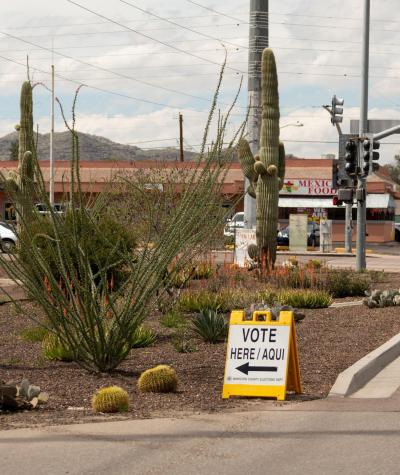Gov. Doug Ducey has signed the anti-voter bill S.B. 1485 into law. This new law creates deliberate barriers for Arizonans trying to exercise their right to vote by effectively eliminating the state’s permanent early voting list (PEVL).
Before today, the PEVL allowed Arizonans to automatically receive a mail ballot from their county recorder every election. Unless a voter’s registration was cancelled or they specifically request to be taken off, they would remain on the list.
By having the default be for voters to stay on the list after they have asked to be added, the PEVL made voting in Arizona more accessible.
S.B. 1485 takes the “permanent” out of the permanent early voter list by creating a process to remove even active voters who exercise their freedom to vote in-person on Election Day or to sit out certain elections for any reason.
If someone only votes on Election Day in two consecutive election cycles, for example, they are subject to removal from the early voting list.
This law erects unnecessary and burdensome barriers to a form of voting that Arizonans have long been accustomed to using and risks wrongfully removing voters from the list.
As of Jan. 5, 2021, 3.2 million (68%) of Arizona voters were on the PEVL, according to the Secretary of State’s office. Overall, around 80% of Arizona voters (2.9 million) receive ballots in the mail, one of the highest rates in the nation.
Had S.B. 1485 been enacted in 2019, around 126,686 Arizonans who voted in 2020 would have been taken off the PEVL. If the law were to be effective for the 2022 elections, it is estimated that between 125,000 to 150,000 voters would be deleted from the early voting list.
S.B. 1485 would harm the state’s Independent voters and communities of color.
Almost a third of Arizona voters—over 1.3 million—identify as Independent. As one elections expert observed, S.B. 1485 would violate Independent voters’ First Amendment right to choose to not be associated with any political party by compelling them to vote in partisan primaries to ensure they stay on the early voter list.
This decreases their ability to have their voice heard in general elections.
Additionally, it is estimated that while Latino voters are 15% of the Arizona electorate, they would make up 35% of those purged from the PEVL list, meaning that approximately 30,000 to 50,000 Latinos could be wrongfully removed.
Meanwhile, Native American voters, who already face significant voting barriers, would be at increased risk due to the frequent lack of home mail delivery service.
S.B. 1485 follows other Arizona anti-voter laws, which multiple courts have ruled had a racially disparate impact on Latino and Native American voters.
In 2021, S.B. 1485 is only one of a flurry of anti-voter bills seeking to cut voting options in the state of Arizona, which led Campaign Legal Center (CLC) to designate it as one of three states to watch for restrictive voting bills.
State legislators have tried advancing several of these bills despite the fact that they are deeply unpopular among Arizona voters. A March 2021 poll from Crooked Media showed that a strong majority of Arizonans—at least six in 10—oppose the state legislature’s effort to strike the PEVL.
The same poll also found similar levels of opposition to state bills that would have required all mail ballots to be notarized, mandated that vote-by-mail ballots be returned in person and rejected mail-in ballots postmarked on Election Day if they are received too late.
Thankfully, the rest of these bills have died and won’t be passed this legislative session.
The attempt of the Arizona state legislature to undermine the PEVL fits into a broader national context. This year, state legislatures around the country are advancing a record number of bills related to voting access. According to the Brennan Center, as of March 24, 2021, legislators have introduced 361 bills with restrictive provisions in 47 states.
While a few of these bills have been signed into law—and subsequently challenged in court by advocacy organizations like CLC—many are still making their way through state legislatures or are pending the signature of their state’s governor.
We must ensure that every person can cast a ballot so we are able to elect leaders who govern in our interests and make the promise of our democracy real for us all. Self-interested politicians should not be able to cherry-pick their voters at the price of Americans losing the freedom to vote.
